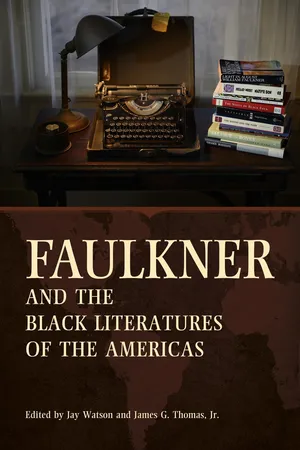
- 320 pages
- English
- ePUB (mobile friendly)
- Available on iOS & Android
Faulkner and the Black Literatures of the Americas
About This Book
Contributions by Ted Atkinson, Thadious M. Davis, Matthew Dischinger, Dotty Dye, Chiyuma Elliott, Doreen Fowler, Joseph Fruscione, T. Austin Graham, Rachel Eliza Griffiths, Derrick Harriell, Lisa Hinrichsen, Randall Horton, George Hutchinson, Andrew B. Leiter, John Wharton Lowe, Jamaal May, Ben Robbins, Tim A. Ryan, Sharon Eve Sarthou, Jenna Sciuto, James Smethurst, and Jay WatsonAt the turn of the millennium, the Martinican novelist Édouard Glissant offered the bold prediction that "Faulkner's oeuvre will be made complete when it is revisited and made vital by African Americans, " a goal that "will be achieved by a radically 'other' reading." In the spirit of Glissant's prediction, this collection places William Faulkner's literary oeuvre in dialogue with a hemispheric canon of black writing from the United States and the Caribbean. The volume's seventeen essays and poetry selections chart lines of engagement, dialogue, and reciprocal resonance between Faulkner and his black precursors, contemporaries, and successors in the Americas.Contributors place Faulkner's work in illuminating conversation with writings by Paul Laurence Dunbar, W. E. B. Du Bois, James Weldon Johnson, Jean Toomer, Nella Larsen, Claude McKay, Ralph Ellison, James Baldwin, Ernest J. Gaines, Marie Vieux-Chauvet, Toni Morrison, Edwidge Danticat, Randall Kenan, Edward P. Jones, and Natasha Trethewey, along with the musical artistry of Mississippi bluesman Charley Patton.In addition, five contemporary African American poets offer their own creative responses to Faulkner's writings, characters, verbal art, and historical example. In these ways, the volume develops a comparative approach to the Faulkner oeuvre that goes beyond the compelling but limiting question of influence—who read whom, whose works draw from whose—to explore the confluences between Faulkner and black writing in the hemisphere.
Frequently asked questions
Information
Index
Table of contents
- Cover
- Half title
- Title
- Copyright
- Contents
- Introduction
- Note on the Conference
- African American Poetic Responses to Faulkner
- The Street Ran through Cities: Faulkner and the Early African American Migration Narrative
- Lingering in the Black: Faulkner’s Illegible Modernist Sound Melding
- Tracking Faulkner in the Paths of Black Modernism
- Miscegenation and Progression: The First Americans of Jean Toomer and William Faulkner
- “Go to Jail about This Spoonful”: Narcotic Determinism and Human Agency in “That Evening Sun” and “A Spoonful Blues”
- Narrative Leaps to Universal Appeal in McKay’s Banjo and Faulkner’s A Fable
- Reconstructions: Faulkner and Du Bois on the Civil War
- “The President Has Asked Me”: Faulkner, Ellison, and Public Intellectualism
- Dangerous Quests: Transgressive Sexualities in William Faulkner’s “The Wild Palms” and James Baldwin’s Another Country
- From Yoknapatawpha County to St. Raphael Parish: Faulknerian Influence on the Works of Ernest J. Gaines
- “For Fear of a Scandal”: Sexual Policing and the Preservation of Colonial Relations in William Faulkner and Marie Vieux-Chauvet
- In the Book of the Dead, the Narrator Is the Self: Edwidge Danticat’s The Dew Breaker as a Response to Faulkner’s Haiti in Absalom, Absalom!
- Contemporary Black Writing and Southern Social Belonging: Beyond the Faulknerian Shadow of Loss
- “It Was Enough That the Name Was Written”: Ledger Narratives in Edward P. Jones’s The Known World and Faulkner’s Go Down, Moses
- Morrison’s Return to Faulkner: A Mercy and Absalom, Absalom!
- Natasha Trethewey’s Joe Christmas and the Reconstruction of Mississippi Nativity
- Contributors
- Index